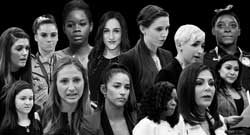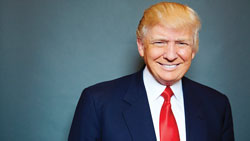Larry Nassar, a former USA Gymnastics doctor, was sentenced to up to 175 years in prison on Wed., Jan. 24.
Circuit Court Judge Rosemarie Aquilina opened her courtroom to numerous survivors, parents, and coaches who had been affected by Nassar’s counts of sexual abuse. 160 women came forward to recount their assaults by Nassar.
“The monster who took advantage of you will wither,” Aquilina said to one victim who gave her testimony at the trial, “…as you get stronger, as you overcome—because you will—he gets weaker and he will wither away.”
Katherine Parkin, Ph.D., Vice President of the Faculty Association and a professor in the Department of History and Anthropology, explained that the charges levied against Nassar differ from most other sexual assault allegations.
“That Nassar was able, with the power of the Michigan State University and the gymnastic governing bodies, to assault these victims under the cover of being a doctor is distinct from some other sexual assault patterns that we’ve seen,” Parkin said.
“In some ways, this was a relatively easier one for the victims and for observers, because there is no expectation that the teenage girls and adult women willingly sought out abuse from a doctor,” she explained, bringing light to the fact that many other sexual assault allegations are dismissed or undermined.
“Harvey Weinstein, Jerry Sandusky, and most of the other criminals had no pretense for touching or assaulting the bodies of others, while it is necessary for a doctor to touch patients,” she explained.
Prior to his four-day sentencing, Nassar wrote a letter saying that he was unsure if he could “mentally” endure four days of listening to his victims’ statements.
“You may find it harsh that you are here listening, but nothing is as harsh as what your victims endured for thousands of hours at your hands, collectively,” Aquilina told Nassar after reading his letter.
“You spent thousands of hours perpetrating criminal sexual conduct on minors. Spending four or five days listening to them is significantly minor considering the hours of pleasure you had [at] their expense and ruining their lives,” she said.
Arianna Guerrero, a gymnast assaulted by Nassar, said during her statement that when she was 13-years-old, Nassar told her he had to look at the size of her pubic bone in order to determine if she had stopped growing.
“You seem to have a hard time looking at me now, but you didn’t when I was half-naked on your table,” Guerrero said to Nassar during her testimony.
Tiffany Thomas Lopez, a softball player assaulted by Nassar while she was at Michigan State, said during her testimony at his trial that she tried to confront two other trainers; she told them that she had been molested by Nassar about ten times.
When Lopez told one of the trainers specifically what Nassar did to her, she “turned bright red” and told Lopez that she was being inappropriate.
After confronting other trainers at the University, Lopez said that they made her feel as if she were crazy for denying treatment from Nassar, because he was a renowned doctor and should be grateful for being treated by him.
“The army you chose in the late ’90s to silence me, to dismiss me and my attempt at speaking the truth, will not prevail over the army you created when violating us,” Lopez said to Nassar in her testimony.
Marie Anderson, a swimmer assaulted by Nassar said during her testimony that Nassar assaulted her number times, even with her parents present in the room.
“My parents, who had my best interest at heart, will forever have to live with the fact that they continually brought their daughter to a sexual predator, and were in the room as he assaulted me,” Anderson said.
Jordyn Wieber, a gymnast and Olympic medalist assaulted by Nassar said during her testimony that admitting she was a victim of Nassar was the hardest thing she had to confront.
“I thought that training for the Olympics would be the hardest thing that I would ever have to do. But, in fact, the hardest thing I would ever have to do is process that I am a victim of Larry Nassar,” Wieber said.
“What is…clear in this case is that the women coming forward have been doing so across 20 years,” Parkin said.
“We are not necessarily in a new phase of victims having a voice or speaking out, but rather, we are in a new phase of those in authority and those with power being held accountable by those who are now willing to assert that this is unacceptable,” she explained
Parkin said that athletes confronting their encounters with sexual assault will hopefully empower others to confront their own: “Young girls grow up watching these incredible athletes like Mary Lou Retton, Shawn Johnson, or Simone Biles.”
“This helps us empathize with their experience, because if we wish we were them, it’s a lot harder to then think this could happen to them,” she added.
Additionally, Parkin explained that women in the workforce are often left “invisible” when they, themselves, admit or attempt to encounter their plights of sexual assault.
“Hopefully we can start to extend that empathy to those cleaning hotel rooms, working in factories, or picking crops in the fields across this country.”
“It is only when citizens of their community, state, or this country decide that being able to abuse ones’ power should not be allowed, that we will gain public oversight of an insular culture that protects abusers from accountability,” Parkin said.



